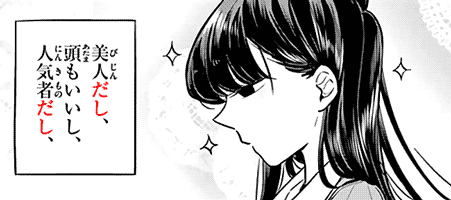For some words, the predicative form ends in the da だ copula, that's when it forms dashi だし, but for other words, like i-adjectives, it does not, and you end up with just shi し.
Beware of homonyms: dashi 出し, "putting out," the noun form of dasu 出す, "to put out," can also mean a Japanese kind of soup stock.
Manga: Komi-san wa, Comyushou desu. 古見さんは、コミュ症です。 (Chapter 14, あがり症です)
- Context: regarding Komi-san 古見さん.
- bijin dashi,
atama mo ii shi,
ninkimono dashi,
美人だし、頭もいいし、人気者だし、
[She] is a beautiful-person, [she] is also smart, [she] is a popular-person,- atama ga ii 頭がいい
Literally "head is good."
To be smart. - Here, shi し comes after words in their predicative forms.
- For adjectives like bijin and ninkimono, those forms are bijin da and ninkimono da, with the predicative copula da だ.
- For an i-adjective like ii いい, "good," the da だ copula isn't necessary, so shi し comes right after it.
- atama ga ii 頭がいい

No comments: